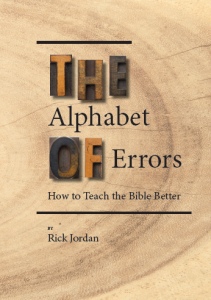I remember that day in seminary like it was yesterday. I asked the professor a question that had been bugging me for years. We were talking about the source theory for the four gospels.

This theory assumes that Mark was the first gospel written. It was the primary source for Matthew’s gospel. Matthew had a different audience than Mark, however, so put the stories and teachings in a different order and also included scriptural references to show how Jesus was the fulfillment of prophecies about the Messiah. Mark was also the primary source for Luke, who also rearranged the stories and teachings in a different order, who also had a different audience, and who focused more on the alienated and marginalized of society. There are other stories that are in Matthew and Luke, but not in Mark. Where did those stories come from? Another, as yet undiscovered source, named Q (for the German quelle, “source”). For this blog, I will not go into further details but will say that this theory makes sense when you look into it and it answers a lot of questions about the gospels’ different emphases and chronologies.
Is this something new?
This was not completely new information to me, as I had been exposed to it in my college Introduction to the Bible courses. At that time, it was completely new. And, frustrating. Not because it didn’t make sense, but because it did. It made so much sense, I wondered why I had never heard of this before? I had been in church all my life with Bible studies at least once a week. Most of my ministers were seminary trained. Surely, they knew about this theory. Why didn’t they ever mention it? The issue bothered me for years in college, but I don’t recall that I ever spoke with anyone about it.

So, finally, the lid blew and that’s when I asked my seminary professor. “Dr. Coble, this makes a lot of sense to me. Is it a new idea?” Dr. Coble answered, “It is a fairly recent theory, but it has been around since 1900.” I knew that my seminary-trained ministers, and maybe the other ministers, had to have been exposed to this theory, then. I asked, “So, is it just now being taught to ministers?” Dr. Coble said, “I was taught it as a student and that was decades ago and I’ve been teaching about it since I became a professor here in 1958.” I continued, “So, why am I just hearing about it? Why haven’t I heard about this in Sunday School or in sermons?” Dr. Coble responded, “I would suggest you ask your teachers and pastors that question. I cannot answer it for them.”
A warning from my pastor
On my next break, I did ask my pastor who had gone to Southeastern Seminary in the 1960s. He warned me that I would be exposed to some good things in seminary, but also some bad things. “You have to separate the wheat from the chaff. To me, the theories of JEDP [a theory of different authors and editors of the Old Testament] and the source theory of the New Testament are dangerous theories that put too much emphasis on man’s part in writing the Word of God.” He suggested I read Evidence that Demands a Verdict by Josh McDowell and present that material to my professors.

Eventually, I have weighed the evidence and come down on the side of the modern scholars. It has not affected my love for, respect for, or trust in the Bible. I believe I now can love, respect, and trust it even more. The source theory is a theory – no Q document has been discovered, no original gospel documents have been discovered. But it makes more sense than removing the human element from the writing of these holy texts. God partners with people, even in the telling, writing, and translation of his message.
Never stop learning
This frustration is the source of my wanting to read and interview today’s scholars. I am not interested in confirming that what I was taught in the 1980s is true. I want to keep learning and I want to share that information with the person in the pew, the teacher who is a non-professional Bible study leader, and the minister who has not been in a seminary classroom for a while.
I want to learn from people who are like me, but also hear from those who approach the Bible differently from me – a white, middle-class, European-American man. I am happy to be each of those, by the way – but I can miss out on fresh understandings of scripture and of following Jesus if I only listen to those people who are like me.
Many more voices
That’s why I want to hear from African-American theologians, women Bible professors, and Jewish scholars. I want to learn from those who work with the poor and the social outcasts. I am interested in learning from the southern hemisphere and from Asian scholars. And, there are other hermeneutic approaches that are newer than what I was taught – those that focus on literary techniques and those that reveal the history of the interpretation of a text, for example. I want to learn from these teachers, as well.
We live in an amazing era. With a computer and an internet connection, we can learn so quickly and easily from people around the world who use different lenses from ours to understand what it means to be a faithful follower of Jesus. That’s why I interview. The interviews are posted every Thursday at greatbibleteachers.com/interviews.

